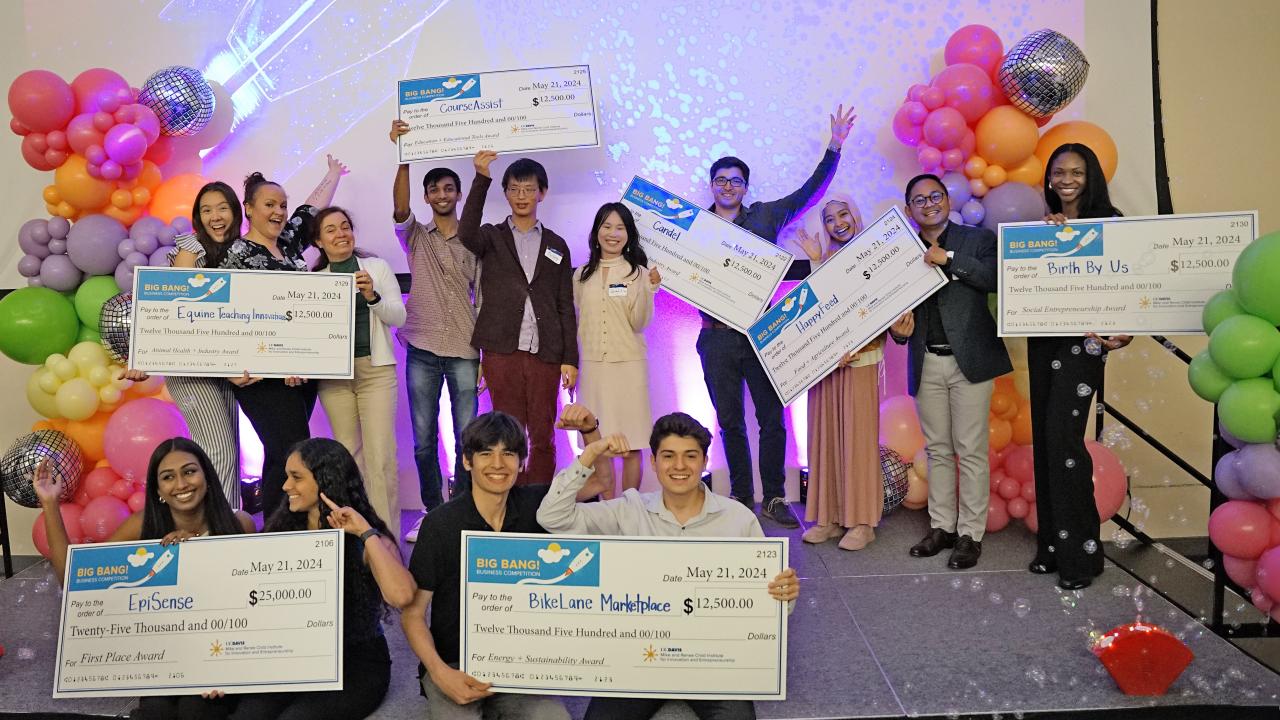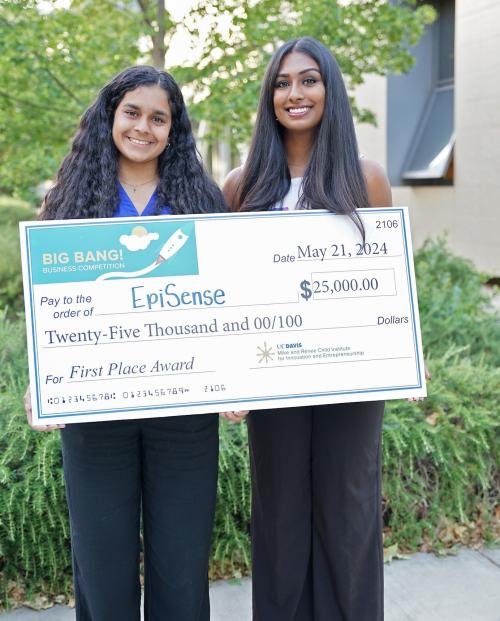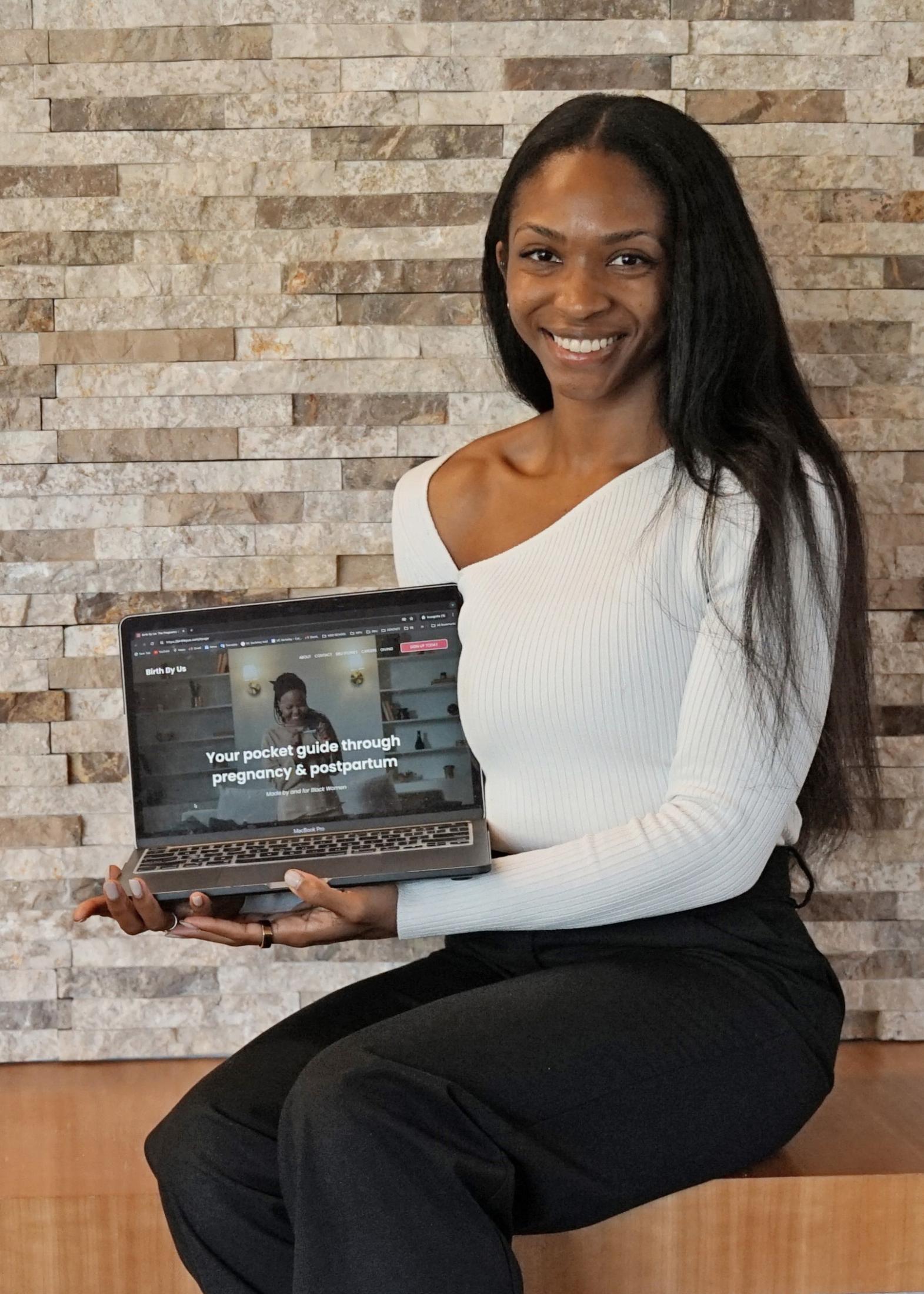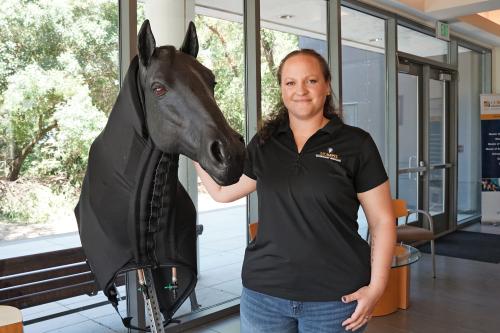
UC Davis Students' Seizure-Predicting Device Wins Top Prize at Big Bang! Business Competition
Other Winning Innovations Improve Black Maternal Health, Offer Affordable Veterinary Training Tools and More
A team of University of California, Davis students received the $25,000 first prize for the best innovation in the 24th annual Big Bang! Business Competition on Tuesday (May 21). The competition is organized by the Mike and Renee Child Institute for Innovation and Entrepreneurship.
EpiSense is a wearable electroencephalogram (EEG) that predicts seizures and can give patients five minutes' advance warning — enough time for them to move to safety and prevent many common seizure-related injuries such as head trauma, choking and broken bones.
The team says it will use the $25,000 prize to support device prototyping and help refine the software and app. They then plan to conduct clinical trials and seek FDA approval to begin marketing their device.
EpiSense previously won $10,000 in the Blackstone Launchpad Ideas Competition and $1,000 in the Little Bang Poster and Pitch competition, both hosted by the UC Davis Institute for Innovation and Entrepreneurship. The team also won the top prize in the PLASMA accelerator program at the Student Startup Center at UC Davis.
Over $100,000 in prizes
The UC Davis Big Bang! Business Competition has been helping entrepreneurs start or grow business ventures for more than two decades through the competition, workshops, mentoring and networking opportunities. This year the Big Bang! was open to teams with a founder or team lead affiliated with a college or university in California. The prizes are funded by corporate, nonprofit and various other sponsors.
The annual awards ceremony celebrated the contestants and announced the winners of $100,000 in cash awards and residencies valued at $8,000 for innovations in animal health, education and educational tools, energy/sustainability, food and agriculture, human health and social entrepreneurship.
Twenty-two finalist teams pitched their ventures before five judges in an eight-hour marathon judging session. Judges considered the teams’ integrated strategy, steps toward implementation and market opportunity to determine prize winners.
Preventing injuries and providing peace of mind for epilepsy patients
About 83 percent of the 65 million people with epilepsy are injured during seizures, amounting to many millions of patients sustaining injuries each year. Medication is ineffective for many patients, and for the ones who do use medication, side effects can cause significant health concerns. “EpiSense provides a solution to these problems, giving patients back their control and freedom and reducing their healthcare costs,” said team co-founder Simran Lallian, a neurobiology, physiology and behavior major at UC Davis.

EpiSense is a wearable device that wraps around the back of the neck and rests on the ears, allowing electrodes to contact the back of the head. When the device detects irregular spikes in brain-wave activity, it sends a mobile alert to the wearer and their designated emergency contacts. It can also alert emergency services if a seizure exceeds five minutes, which can reduce the risk of long-term brain damage. The EpiSense app also allows patients to access their past EEG data and log information about an episode. To further improve health outcomes, the device can track sleep and stress levels, and offer suggestions to reduce common seizure triggers.
Team co-founder Jaya Athuluru, a cognitive science major at UC Davis, said participating in the Big Bang! Competition helped them focus on what was most important in the development process. “The best advice we received was to focus on market fit as we translate clinical science into a product patients will wear in their daily lives. Balancing these two is critical to our overall success because it ensures the product is effective and fits into the realistic constraints of everyday life.”
Other members of the all-UC Davis winning team include product designers Nicole Chen (neurobiology, physiology and behavior) and Zubaira Amin (cognitive science); hardware prototyping engineer Suvan Sudan (mechanical engineering); hardware and software integration engineer Mihir Juneja (electrical engineering); and software developers Shivam Bhandari (computer science) and Aditya Sharma (computer science and engineering).
Providing maternal health security to Black women
Black women are currently three- to four-times more likely to die in childbirth compared to their White counterparts, often due to missed signs and dismissal by providers. Black women and expectant parents often feel disempowered during pregnancy and postpartum. Many medical providers are aware of the statistics surrounding Black maternal health and want to create change but feel they lack the insights and effective strategies to help end the crisis.

UC Davis medical student Ijeoma Uche and co-founder Mercy Oladipo, an MIT graduate based in Chicago, decided to build a new vision for maternal health by combining data analytics with resources that can help patients achieve their best possible outcomes for themselves and their families.
Birth By Us is a digital platform that merges medical research with Black-focused, patient-centered care. It provides comprehensive check-ins at critical points in pregnancy and postpartum using research-focused questionnaires. The app analyzes users’ responses about their health and their experiences with care providers. It yields tailored visit preparation and recommends culturally responsive resources — which are especially crucial during the postpartum period, when parents often experience a drop off in provider support.
Providing lower-cost basic veterinary education
Equine Teaching Innovations is a silicone injection pad that enables student animal health professionals to learn basic injection skills in a life-like way, without injecting a live animal and without the high cost of full-sized silicone animal models.

Beginners can start by learning basic needle and syringe handling using the injection pad alone. Advanced students can apply restraint and handling concepts by mounting the injection pad to a live animal for a more realistic simulation. The relatively low product cost enables a broader range of students to have access, including undergraduate programs, high schools and veterinary technician institutions.
The team took home the $12,500 Animal Health Award. Team members are all based at the UC Davis School of Veterinary Medicine and include co-founder Melyssa Rehman, clinical skills laboratory manager; co-founder Lais Costa, DVM; marketing officer Nicole Gonzales; and development officer Amanda Ayers.
Other winners
An additional $50,000 in Big Bang! cash prizes was awarded Tuesday.
Candel Medical Company of Davis and Santiago, Chile: Neuromodulation technology for faster and better rehabilitation of stroke, traumatic brain injury and chronic neurological pain. Human Health Award, $12,500. CEO Raul Castillo-Astorga, M.D., and UC Davis Ph.D. student in biomedical engineering; CSO Lucía del Valle Batalla, M.D.; CTO Joaquín Zepeda Valero; COO/CFO Sebastián Muena Cortés; software developers Tiare Vera and David Garcia; and hardware developer Omar Espinoza.
HappyFeed based in Sleman, Indonesia, provides meal planning, nutrition tracking, and guidance for parents to create a nutritious, enjoyable eating experience for parents and children. Food and Agriculture Award, $12,500. Co-founders CEO Davrina Rianda, UC Davis nutritional biology Ph.D. student, CFO/CMO Galih Setiawan, UC Davis MBA student; and CTO Nathanael Thomas.
CourseAssist of Davis is a customizable, course-specific learning assistant that follows a course’s actual curriculum to provide high-quality tutoring, available 24/7. Education and Educational Tools Award, $12,500. Co-founders and UC Davis computer science graduate students Ty Feng, Kunal Mundada and Sarah Liu; and Isabel Shic, UC Davis computer science undergraduate.
BikeLane Marketplace of Davis connects bike collectives that have an abundance of niche parts with cycling enthusiasts who want to buy them. Energy and Sustainability Award, $12,500. Team members Kutay Ozcelik, Davis High School student, Deniz Sumer, Roseville High School student, Rohan Jhingan, UC Davis undergraduate student, and Aaron Shaw, UC Davis mechanical engineering graduate.
The competition also awarded two residency awards, with a combined estimated value of $8,000.
- SeaNails of Davis: repurposes fish waste into a healthier nail alternative to address health concerns related to traditional nail products and environmental issues stemming from plastic pollution and fish waste decomposition. Laboratory space at startup incubator Inventopia with an estimated value of $4,000. CFO and co-founder Leslie Valdez is a design major at UC Davis; CEO and co-founder Sarika Kumar is an industrial design engineering major at Delft University of Technology; CTO and Co-founder Yuwei Chang is an integrated product design major at University of Pennsylvania.
- Microbehavior of Davis: offers a modular testing platform that costs under $10,000, is easy to use and gives researchers full control over their experiments, allowing them to speed up medical breakthroughs. Laboratory space at AgStart with an estimated value of $4,000. Co-founder Jacob Roshgadol is a biomedical engineering graduate student at UC Davis; co-founder Shamanique Bodie is a UC Davis Online MBA student.